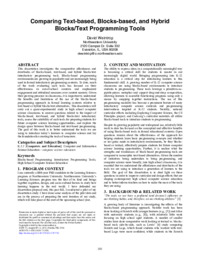Comparing Text-based, Blocks-based, and Hybrid Blocks/Text Programming Tools Publikationsdatum:
Zu finden in: ICER 2015 (Seite 283 bis 284), 2015
|
 |
 Diese Seite wurde seit 5 Jahren inhaltlich nicht mehr aktualisiert.
Unter Umständen ist sie nicht mehr aktuell.
Diese Seite wurde seit 5 Jahren inhaltlich nicht mehr aktualisiert.
Unter Umständen ist sie nicht mehr aktuell.
 Zusammenfassungen
Zusammenfassungen
This dissertation investigates the comparative affordances and drawbacks of blocks-based, text-based, and hybrid blocks/text introductory programming tools. Blocks-based programming environments are growing in popularity and are increasingly being used in formal introductory programming contexts. To date, much of the work evaluating such tools has focused on their effectiveness in out-of-school contexts and emphasized engagement and attitudinal measures over content mastery. Given their growing presence in classrooms, it is important to understand the benefits and limitations of the use of the blocks-based programming approach in formal learning contexts relative to text-based or hybrid blocks/text alternatives. This dissertation will carry out a quasi-experimental study in high school computer science classrooms to answer questions related to the impact of blocks-based, text-based, and hybrid blocks/text introductory tools, assess the suitability of such tools for preparing students for future computer science learning opportunities, and explore the design space between blocks-based and text-based programming. The goal of this work is to better understand the tools we are using to introduce today's learners to computer science and lay the foundation for creating the tools of tomorrow.
 Dieses Konferenz-Paper erwähnt ...
Dieses Konferenz-Paper erwähnt ...
 Dieses Konferenz-Paper erwähnt vermutlich nicht ...
Dieses Konferenz-Paper erwähnt vermutlich nicht ... 
 Nicht erwähnte Begriffe | informal learning, Informatik-Didaktik, Informatik-Unterricht (Fachinformatik), Scratch |
 Tagcloud
Tagcloud
 Zitationsgraph
Zitationsgraph
 Zitationsgraph (Beta-Test mit vis.js)
Zitationsgraph (Beta-Test mit vis.js)
 Anderswo finden
Anderswo finden
 Volltext dieses Dokuments
Volltext dieses Dokuments
 |  Comparing Text-based, Blocks-based, and Hybrid Blocks/Text Programming Tools: Fulltext at the ACM Digital Library ( Comparing Text-based, Blocks-based, and Hybrid Blocks/Text Programming Tools: Fulltext at the ACM Digital Library ( : :  , 648 kByte; , 648 kByte;  : :  Link unterbrochen? Letzte Überprüfung: 2020-11-28 Letzte erfolgreiche Überprüfung: 2020-05-28) Link unterbrochen? Letzte Überprüfung: 2020-11-28 Letzte erfolgreiche Überprüfung: 2020-05-28) |
 Anderswo suchen
Anderswo suchen 
 Beat und dieses Konferenz-Paper
Beat und dieses Konferenz-Paper
Beat hat Dieses Konferenz-Paper während seiner Zeit am Institut für Medien und Schule (IMS) ins Biblionetz aufgenommen. Beat besitzt kein physisches, aber ein digitales Exemplar. Eine digitale Version ist auf dem Internet verfügbar (s.o.). Es gibt bisher nur wenige Objekte im Biblionetz, die dieses Werk zitieren.









 Lernen
Lernen Programmieren
Programmieren



 Biblionetz-History
Biblionetz-History